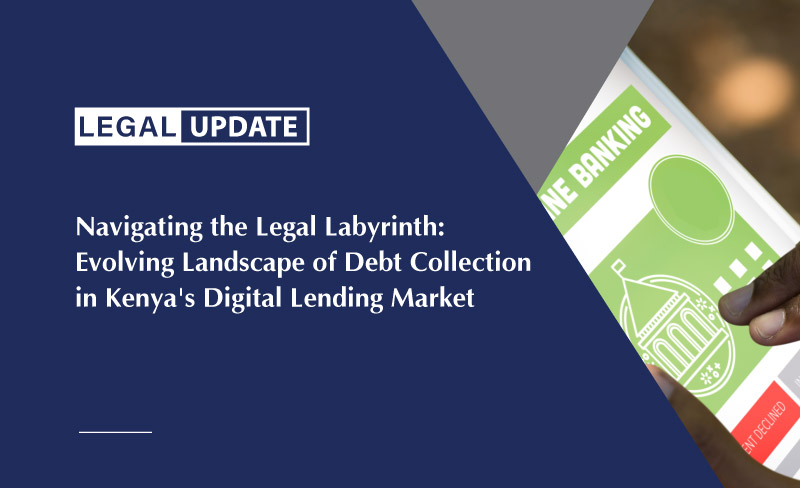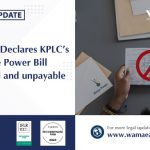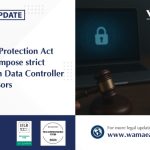INTRODUCTIONAccess to financing has completely changed with the growth of digital credit, especially in developing nations where traditional banking systems could be more difficult to access. With a few taps on a smartphone, individuals can now borrow money for everything from groceries to medical emergencies. However, the ease of borrowing comes with its own set of challenges, one of the most pressing being the issue of debt collection by digital credit providers.Although this emerging sector promotes financial inclusion, its aggressive and frequently unscrupulous debt collecting methods have come under fire, notably with instances of violation of Article 31 of the Constitution of Kenya. Reported incidents of intimidation, harassment, and even threats have surfaced, presenting an image of susceptible borrowers ensnared in a vicious cycle of debt and hopelessness. This is not just a matter of individual hardship; it also involves issues of fairness, consumer protection, and wider financial ramifications. This paper seeks to discuss the legal framework on debt collection by digital credit providers in Kenya.
LEGAL FRAMEWORK ON DEBT COLLECTION BY DIGITAL CREDIT PROVIDERS
The regulation of debt collection by digital credit providers in Kenya is a rapidly evolving landscape. Before 2022, lack of specific regulations left borrowers vulnerable to unfair and abusive practices. However, the Central Bank of Kenya (CBK) issued the “Legal Notice No. 46 of 2022, the Central Bank of Kenya (Digital Credit Providers) Regulations, 2022”, which introduced significant protections for borrowers. On 23rd December, 2023 the ODPC released a Guidance Note for Digital Credit Providers.
The guidance note serves as a guide for Digital Credit Providers (DCPs)on how to handle personal data responsibly while abiding by both the Data Protection Act and the regulations set forth by the Office of the Data Protection Commissioner.
Here’s a breakdown of what you’ll find:
- Introduction to the ODPC: This section outlines the agency’s purpose, goals, and commitment to protecting individual privacy.
- Understanding DCPs: Highlighting the positive impact of DCPs on society, while emphasizing the importance of data privacy within their operations.
- Legal Landscape: Providing an overview of relevant legislative frameworks governing DCPs.
- Balancing Privacy and Innovation: The guidelines aim to equip DCPs with tools to safeguard personal data and comply with DPA regulations, while fostering responsible innovation in the sector.
Remember, this guide is not a replacement for the actual law. Instead, it serves as a clear and concise roadmap to help DCPs navigate the data protection landscape and ensure they operate in compliance with the DPA and regulations.
Let’s delve into the key elements of the Central Bank of Kenya (Digital Credit Providers) Regulations, 2022, particularly on debt collection. Further the CBK, introduced further regulations on the sector through the Banking (Credit Reference Bureau Regulations) 2020 (CRB Regulations 2020), which we have previously highlighted their raft of measures.
- Procedure for Debt Collection
It is noteworthy that the Central Bank of Kenya (Digital Credit Providers) Regulations, 2022 (hereinafter referred to as ‘the Regulations’) does not provide for a procedure of debt collection by digital credit providers. The Regulations however states the don’ts in debt collection by digital credit providers. Regulation 20 of the Regulations provides that a digital credit provider, its officers, employees or agents shall not, in the course of debt collection, shall not engage in the following:
(a) use of threats, violence, or other coercive tactics to damage the debtor’s person, property, or reputation;
(b) sending derogatory or obscene messages to the debtor, their references, or other contacts in an attempt to discredit them;
(c) accessing the debtor’s phone book, contacts list, or other phone records in order to send them messages in the event that they fail to make payments on time;
(d) disclosing the debtor’s private or sensitive information online or on any other forum or medium for purposes of shaming them;
(e) make unsolicited or unauthorized calls or messages to a customer’s phone number or other contacts;
(f) use dishonest or unethical methods, strategies, or actions in debt collection; or
(g) engage in any other behavior that could be interpreted as intimidating, abusing, or harassing someone in the course of collecting a debt.
It is noteworthy that most of these prohibited conducts in debt collection by digital credit providers have not been subject to litigation bearing in mind that Regulations were made recently. This does not mean that there was absolutely no law that governed debt collection by digital credit providers in Kenya. The Constitution of Kenya, 2010 under Article 28, for example, provides that every person has the right to inherent dignity and the right to have that dignity respected and protected. This impliedly protects individuals from unfair debt collection practices, including harassment, debt shaming and violence. Furthermore, Article 31 of the Constitution states that Every person has the right to privacy, which includes the right not to have private affairs unnecessarily required or revealed. This provision prohibits the disclosure of debtor’s private or sensitive information online by digital credit providers. This was in fact explained by the High Court in Felix Apollo Owuor v Kenya Industrial Estates Limited [2016] eKLR, where it was held that, ‘At the core of credit information is the right to privacy and the protection against wrong and harmful information being released.’
- Remedies Available to Borrowers in the Event of Breach of The Regulations in Debt Collection
Having discussed the prohibited conducts in debt collection by digital credit providers, it is now important to discuss the remedies available to borrowers when digital credit providers engage in such. Some of these remedies are discussed below.
First is lodging a complaint with the digital service provider. Regulation 22(1) of the Regulations obligates all digital credit providers to establish a complaints redress mechanism, including a dedicated channel for communicating customer complaints, and ensure proper communication of this mechanism to its customers. Regulation 22(2) further states that a customer complaint should be resolved promptly, and where immediate resolution is not possible, within thirty days after lodging of the complaint.
Second, borrowers can report unfair and or illegal debt collection practices to the Central Bank of Kenya for investigation. The Bank may impose the sanctions enumerated under regulation 37 of the Regulations against the digital credit provider. Third, borrowers can opt sue the digital credit provider in court for damages or injunctive relief if they have suffered harm due to unfair debt collection practices. Lastly, if the prohibited conduct revolves around the right to privacy, borrowers could lodge their complaints before the Office of Data Protection Commissioner under Section 56 of the Data Protection Act, 2019.
- Penalties that may be Imposed on Digital Credit Providers who Engage in Prohibited Conducts in debt Collection
Digital credit providers who fail to comply with the provisions of the CBK Act and the regulations are at risk of facing enforcement and administrative sanctions. For instance, when a person who contravenes the regulations is liable to imprisonment for a term not less than 3 years, or a fine not exceeding 5 million or both. They can also have their license revoked when they conduct their business in a manner that is detrimental to the interests of its customers or members of the public.
CONCLUSION
While digital credit has expanded financial access in Kenya, concerns linger regarding aggressive debt collection practices. We note that this aggressive conduct may be due to the lack of adequate securities, or insufficient financial information pertaining to the borrower, thus, exposing the lenders to substantive losses in the event of a default. However, this does not excuse the aggressive and unlawful debt collection measures implored by the Credit lenders.
The Central Bank’s 2022 regulations outline prohibited behaviors like harassment and shaming, offering borrowers legal recourse through complaints mechanisms and lawsuits. Though litigation, testing these regulations is nascent, existing laws like the Constitution provide for the right to privacy, dignity and consumer protection. Enforcement measures against non-compliant lenders include hefty fines and license revocation, which are welcome to ensure a more streamlined and friendlier operating environment for all stakeholders. As this sector matures, stricter enforcement and potential revisions to the legal framework can further safeguard borrowers and ensure responsible debt collection practices within Kenya’s digital lending landscape.
This article is provided free of charge for information purposes only; it does not constitute legal advice and should be relied on as such. No responsibility for the accuracy and/or correctness of the information and commentary as set in the article should be held without seeking specific legal advice on the subject matter. If you have any query regarding the same, please do not hesitate to contact Litigation Department at Litigation@wamaeallen.com
 Loading...
Loading...
About the author
- Wamae Allenhttps://wamaeallen.com/author/wamaeallen/
- Wamae Allenhttps://wamaeallen.com/author/wamaeallen/
- Wamae Allenhttps://wamaeallen.com/author/wamaeallen/
- Wamae Allenhttps://wamaeallen.com/author/wamaeallen/










